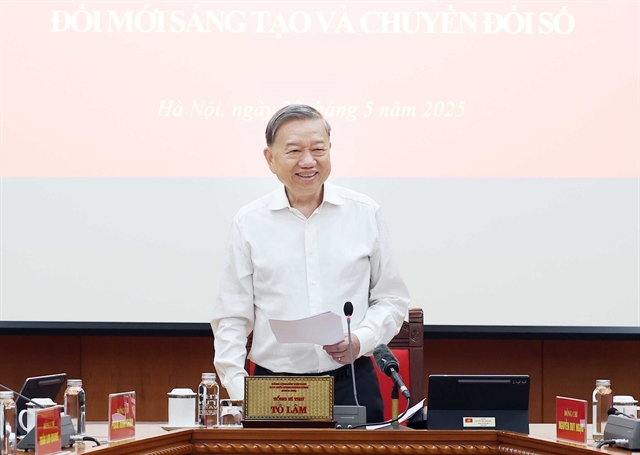 Society
Society


|
| Party General Secretary Tô Lâm addresses the meeting on science, technology, innovation and digital transformation on Thursday. — VNA/VNS Photo Thống Nhất |
HÀ NỘI — Institutional bottlenecks in science, technology, innovation and digital transformation must be promptly addressed to achieve national growth targets, said Party General Secretary Tô Lâm.
He was speaking at a meeting of the national steering committee on science, technology, innovation and digital transformation on Thursday.
The Party chief said that in the first five months of 2025, government bodies and units had actively taken actions to improve institutional frameworks and policies in this field, following the Politburo’s Resolution No 57-NQ/TW dated December 22, 2024.
Their measures include promoting the use of population data, providing public data online to citizens and enterprises, and establishing a consistent digital infrastructure from central to local levels.
However, he noted that institutional frameworks remain the biggest challenges and urged efforts to define the list of strategic technologies aligning with the country’s context, alongside specific policies to promote collaboration between the State, academia and businesses.
Technology infrastructure, especially key laboratories and research centres, is still underdeveloped, in addition to fragmented data systems, he said.
Lâm also pointed out limited progress in digital transformation among businesses which reduces productivity and competitiveness in global supply chains, and outdated state management approaches in science, technology and education. Additionally, the data and information for policy-making and research lack updates and systematisation.
Reports from the first half of 2025 showed that 65 tasks across ministries and localities remain overdue, which the Party chief said must be resolved within the next month.
Clear accountability must be assigned to each unit and especially to its leadership, Lâm said, adding that people in charge “must be held accountable if tasks are not completed without valid reasons. These cannot be brushed aside or carried out based on whim.”
He urged heads of ministries, sectors and local authorities to enhance leadership and oversight and to tailor the implementation of Resolution 57 to local and institutional contexts.
He also called for more training programmes on science, technology, innovation and digital skills for public officials, especially their management capacities regarding this aspect. A reasonable allocation of technical professionals within management bodies is also recommended.
The Party Central Committee’s office is assigned to work with relevant units to increase communication activities on Resolution No 57, and to recognise and promote exemplary models during implementation.
The Central Inspection Commission is tasked with monitoring this process, promptly addressing shortcomings, and ensuring effective compliance.
The Government’s ministries and the National Assembly’s committees will work together to complete the draft laws for review and adoption, such as the Law on Science, Technology, and Innovation, the Law on Digital Technology Industry, the Law on Investment, among others.
Strategic technologies
Emphasising the importance of strategic technologies in national development, Party chief Lâm instructed the Ministry of Science and Technology (MoST) to continue leading and coordinating with relevant units to finalise the country’s list of strategic technologies.
This document must be developed based on scientific methodology, ensuring transparency and consistency and aligning with national strategies and directions. It must serve the country’s 2030-45 growth targets, embrace breakthrough thinking and calculated risk-taking in emerging areas, while upholding Việt Nam’s spirit of autonomy, resilience and self-reliance.
The list will remain open and subject to frequent updates based on global tech trends, local and international contexts, and lessons learned during implementation. The MoST is responsible for proposing updates and ensuring the list is closely tied to institutional reforms, human resource development and infrastructure growth.
Other focuses in the near future include encouraging the engagement of the private sector in research and development, and international cooperation in this field.
Earlier the same day, a ceremony was held to announce the National Advisory Council on Science, Technology, Innovation and Digital Transformation. The council consists of government officials and leading scientists and experts from natural and social sciences, technology, economy, education and finance. — VNS